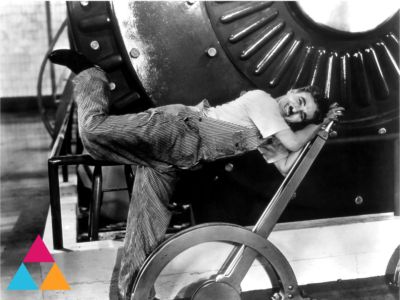In the past, workers were paid to act like machines. Increasingly, we generate value through our innately human qualities.
How do we as employees and managers create value in an A.I.-powered economy?
I have been contemplating this question – if not every day then at least once a week – ever since reading Calum Chace’s Economic Singularity in 2016.
The future is coming more quickly than we imagine. Ezra Klein recently quoted Paul Christiano, a former member of OpenAI:
The broader intellectual world seems to wildly overestimate how long it will take A.I. systems to go from ‘large impact on the world’ to ‘unrecognizably transformed world’. This is more likely to be years than decades, and there’s a real chance that it’s months.
We owe it to each other – and to future generations – to understand and shape these shifts. As employees and managers we owe it to ourselves, our colleagues, and those we provide for, to understand how each of us contributes value in an an A.I.-powered economy.
What do we value as consumers?
To find an answer, I find it helpful to reflect on what I value most as a consumer. For example:
- The waiter who recognizes me, knows what I like, and asks me about my day.
- Brands that are purpose-driven, transparent and trustworthy.
- Apps that are intuitive, reliable and secure, and don’t nag me.
Organizations may be able to use Artificial Intelligence to enhance each of these experiences, but A.I. cannot deliver these qualities consistently without humans.
As the stuff computers can do becomes ever cheaper, the human touch will become relatively more valuable.
What is the human touch, according to ChatGTP?
I asked ChatGTP what qualities make human consciousness different from artificial intelligence.
- Self-awareness: Human consciousness involves a sense of self-awareness, which means that we are aware of our own existence and have the ability to reflect on our own thoughts and experiences. AI, on the other hand, lacks this kind of self-awareness.
- Creativity: While AI can be programmed to perform specific tasks, it does not possess the same level of creativity as human consciousness. Humans have the ability to generate new ideas and come up with novel solutions to problems that have not been encountered before.
- Emotional intelligence: Human consciousness is also characterized by emotional intelligence, which includes the ability to understand and manage our own emotions, as well as recognize and respond to the emotions of others. AI lacks the same level of emotional intelligence.
- Flexibility: Human consciousness is capable of adapting to new situations and changing circumstances, and can learn from experience. AI, on the other hand, is limited to the specific tasks it has been programmed to perform and may not be able to adapt to new situations without additional programming.
- Morality: Finally, human consciousness is capable of making moral judgments and decisions based on ethical principles and values. AI lacks the same level of moral judgment and decision-making abilities, as it operates purely on algorithms and rules set by its programmers.
These five qualities of self-awareness, creativity, emotional intelligence, flexibility and morality all have their place in my three examples of value creation. I would add care and compassion to ChatGTP’s list.
- The waiter demonstrates emotional intelligence.
- People at all levels in the organization behind the purpose-driven brand are co-creating and acting with morality. Co-creation depends on emotional intelligence and flexibility.
- The intuitive apps are built by people who care about the experience of customers and are empowered to make choices on our behalf.
I’d love to hear your answers to any of these questions…
- What do you value most as a consumer in the economy?
- Do you agree with this? “In the past, workers were paid to act like machines. Increasingly, we generate value through our innately human qualities.” Am I too optimistic here?
- When you think about your own career development and that of your team or organization, what capabilities seem most important to to develop?
- How are you developing (or how might you develop) these capabilities?



Leave a Reply